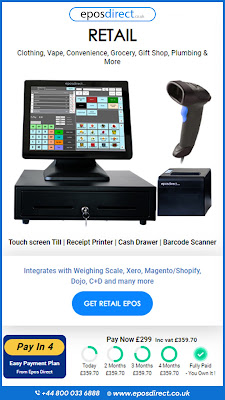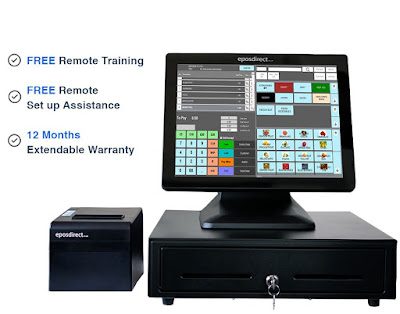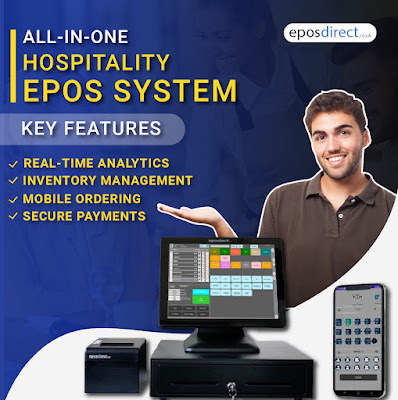The retail industry has
experienced significant transformations over the years, driven by technological
advancements and changing consumer expectations. One such technological
innovation that has revolutionized the way retailers operate is the Electronic
Point of Sale (EPOS) system. EPOS systems have become an integral part of
modern retail businesses, providing numerous benefits and transforming the way
transactions are processed, inventory is managed, and customer relationships
are nurtured. In this article, we will explore the role of Epos tills in revolutionizing the retail industry.
1. Streamlining Sales Processes:
EPOS systems have greatly
streamlined the sales processes in retail stores. With an electronic point of sale system, the traditional cash register is
replaced by a computer-based system that allows for faster and more accurate
transactions. Retailers can scan barcodes or use RFID technology to quickly
register items, calculate prices, and process payments. This efficiency not
only saves time but also reduces the chances of human error, leading to more
accurate sales records.
2. Real-Time Inventory Management:
One of the key advantages of retail
till systems
is their ability to provide real-time inventory management. With traditional
systems, retailers had to rely on manual stock checks, which were
time-consuming and often prone to errors. EPOS systems, on the other hand,
automatically update inventory levels as items are sold, allowing retailers to
have an accurate view of their stock at any given moment. This real-time
visibility enables businesses to optimize their inventory levels, reduce
stockouts, and make informed purchasing decisions.
3. Enhanced Customer Relationship Management:
POS
till systems in UK
play a crucial role in nurturing customer relationships. These systems allow
retailers to capture valuable customer data, such as purchase history,
preferences, and contact information. With this data, retailers can personalize
the shopping experience, offer targeted promotions, and build customer loyalty
programs. EPOS systems also facilitate the integration of customer relationship
management (CRM) software, enabling retailers to analyze customer behavior,
identify trends, and make data-driven decisions to enhance customer
satisfaction.
4. Integrated Analytics and Reporting:
Another significant advantage of
EPOS systems is their ability to generate detailed analytics and reports. These
systems capture a wealth of data on sales, inventory, and customer behavior,
which can be analyzed to gain valuable insights. Retailers can identify
top-selling products, peak sales periods, and customer buying patterns. This
information helps retailers optimize their product offerings, pricing
strategies, and marketing campaigns. Retail
till system also generate comprehensive reports on sales performance,
inventory turnover, and profit margins, allowing retailers to monitor their
business's financial health.
5. Efficient Staff Management:
EPOS systems contribute to
efficient staff management in retail stores. These electronic till systems can track individual employee sales
performance, hours worked, and commission calculations. This data helps
retailers evaluate staff productivity, reward high performers, and identify
training needs. EPOS systems also facilitate the scheduling of shifts, enabling
retailers to optimize staff allocation based on sales data, footfall patterns,
and seasonal demands. By automating these processes, electronic till system frees up time for managers to
focus on other important aspects of store operations.
6. Integration with E-Commerce:
As e-commerce continues to grow,
the integration of till systems in UK
with online platforms has become crucial for retailers. EPOS systems can be
seamlessly connected with e-commerce websites, allowing retailers to manage
inventory, process orders, and synchronize product information across multiple
channels. This integration provides a unified view of stock levels, prevents
overselling, and ensures consistent pricing and product availability across
online and offline channels. By bridging the gap between physical and online
retail, EPOS systems enable retailers to offer a seamless and convenient
shopping experience to customers.
In conclusion, till systems for retail have revolutionized the retail industry by streamlining sales processes, providing real-time inventory management, enhancing customer relationship management, offering integrated analytics and reporting, enabling efficient staff management, and facilitating integration with e-commerce platforms. As technology continues to advance, we can expect POS till systems to evolve further, providing even more sophisticated features and capabilities. Retailers that embrace these systems and leverage their full potential are likely to gain a competitive edge in an increasingly dynamic and customer-centric retail landscape.





